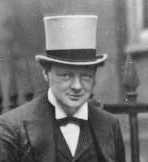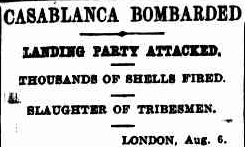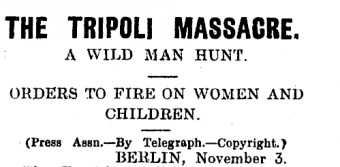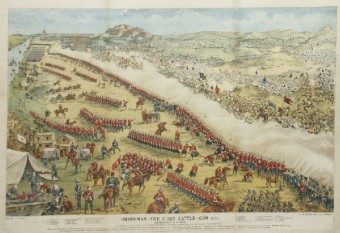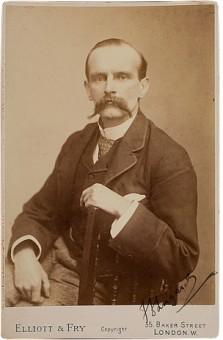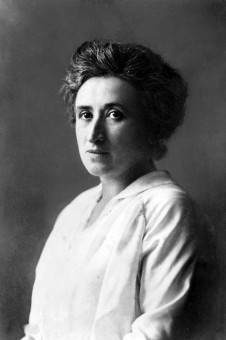In his prime time apologia for the First World War, journalist and former Telegraph editor Max Hastings argued that the conflict had been ‘tragically necessary’ because ‘[t]he people in Germany cared nothing for democracy or other people’s freedoms’. [2] In a similar vein, the then Secretary of State for Education, Michael Gove, claimed that, ‘The ruthless social Darwinism of the German elites [3], the pitiless approach they took to occupation, their aggressively expansionist war aims and their scorn for the international order all made resistance more than justified.’ [4]
In reality, British, French, Russian, Italian and US elites, also ‘cared nothing for democracy or other people’s freedoms’. Indeed, occupation, massacre and imperial exploitation were commonplace in Gove’s ‘international order’ and continued, without a pause, as soon as the First World War had ended. [5]
They were also actively opposed by many of those who resisted the First World War.
The First World War?
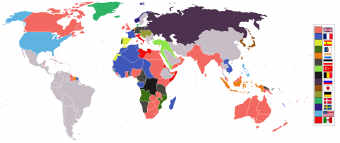
World empires and colonies in 1914, just before the First World War. Image by Andrew0921 on Wikimedia Commons.
The very term ‘The First World War’ is actually highly ideological in nature. Viewed from the Global South there was already a ‘world war’ in progress on 27 June 1914: namely, a war by the European (and American) empires against much of the rest of the world.
Indeed, ‘[b]etween 1800 and 1914 the proportion of the earth’s surface occupied by Europeans, whether in colonies or former colonies, rose from 35 to 84.4 per cent’ [6] – and the process whereby this happened was very far from peaceful.
Whatever lofty rhetoric was used to justify it in public, in private the architects of this ‘aggressive expansion’ were sometimes quite forthright about what was involved. For example, in a secret January 1914 memo, Winston Churchill – then First Lord of the Admiralty – noted that:
‘[W]e are not a young people with an innocent record and a scanty inheritance …. We have got all we want in territory, and our claim to be left in the unmolested enjoyment of vast and splendid possessions, mainly acquired by violence, largely maintained by force, often seems less reasonable to others than to us.’ [1]
Plucky Little Belgium
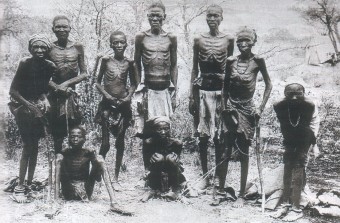
Surviving Herero after the escape through the arid desert of Omaheke in German South-West Africa (modern day Namibia), c. 1907. Source: Wikimedia Commons.
German atrocities in the pre-war period were real enough. Scores-of-thousands of people were killed in German South-West Africa (in what is today Namibia), following German Commander General Albert von Trotha’s October 1904 proclamation that ‘ Any Herero found within the German borders with or without a gun, with or without cattle, will be shot.’ [7]
According to the official account of that ‘war’:
‘The month-long sealing of desert areas, carried out with iron severity, completed the work of annihilation … The death rattles of the dying and their insane screams of fury … resounded in the sublime silence of infinity’. [8]
However, Max Hastings’ claim – in the context of justifying Britain’s participation in WW1 – that ‘even by the imperial standards of the day’ this genocide was ‘worse than any British excess’ is disingenuous. [9]
Worse than any British ‘excess’ (the choice of words is in itself highly revealing) it might have been, but in absolute terms it paled before Belgium‘s then-ongoing genocidal depredations in King Leopold’s singularly ill-named Congo Free State.
Between 1880 and 1920, the population of the Congo was cut ‘by at least half’ – some ten million people – mainly as a result of murder, starvation, disease and a plummeting birth rate. [10]
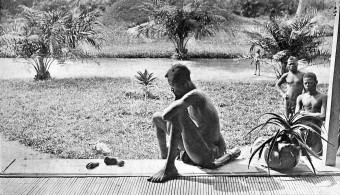
Nsala sits with the hand and foot of his five-year-old daughter, Boali, 1904. The systematic cutting off of hands by Belgian colonists and their proxies was widely practiced in King Leopold’s Congo. Photograph: Alice Seeley Harris. Source: Wikimedia Commons.
Ironically, the most memorable of the crimes (falsely) levelled against Germany during its occupation of Belgium – that German soldiers were cutting off the hands of Belgian children – had been a reality in the Congo. [11] In November 1904, M’Putila of Bokote told the official Commission of Inquiry:
‘When I was very small, the soldiers came to make war in my village because of the rubber … A soldier used a knife to cut off my right hand and took it away. I saw that he was carrying other cut-off hands …’ [12]
His testimony – along with that of hundreds of others – was apparently kept in the closed section of the state archive in Brussels until the 1980s. [13]
Interested only in drawing parallels between the Kaiser’s Germany and the Nazis, Hastings passes over these inconvenient facts in silence. [14]
Morocco Crises
So much for Britain’s casus belli. What of our ally France, the entente [15] with which was the real reason for Britain’s entry into the War? [16]
No account of the origins of the First World War is complete without references to the ‘Morocco Crises’ of 1905 and 1911 – two diplomatic crises involving France and Germany. But there is seldom any reference made to the crisis for the Moroccan people caused by France’s ‘aggressive expansion’ into their country during this same period. [17]
For example, how many people in Britain know that in August 1907 France shelled Casablanca, killing many people and destroying parts of the city? At the time, the Sydney Morning Herald reported that, ‘The stench from the corpses at Casablanca is so bad that that the air is foetid a mile off the coast’. [18] The French then invaded and occupied the city, and in 1911 France precipitated the second ‘Morocco crisis’ by further invading the country on the ‘bogus’ pretext that French troops were necessary to protect Europeans in Fez. [19]
In 1912 Morocco became a French protectorate and France began the ‘slow process of conquest’ of the rest of the country, ‘the high-minded qualities of [whose] individual colonial officer[s] could not mask the brutality of the spreading occupation.’ [20] Thus, in November 1914, following a military setback, French forces ‘ranged across the plains and foothills’, ‘[b]ombarding villages at will’, ‘impos[ing] an economic blockade, depriving the tribesmen of access to their traditional markets, and … employ[ing] scorched earth techniques to destroy their crops.’ [21]
A pact between predators
After Britain signed its 1907 Convention with Russia, the British socialist newspaper Justice condemned the agreement as ‘a pact between predators’ who had come to terms over their ‘respective areas of spoliation.’ [22] Despite promising to ‘to respect the integrity and independence’ of Persia, the Convention actually divided the country into a Russian zone (north), a middle zone (neutral), and a British zone in the south-east – and the two powers had no intention of letting Persians run their own affairs.
In 1905 – 1907, during the first phase of the Iranian constitional revolution, the Iranian opposition had managed, using overwhelmingly nonviolent means, to establish both a majles (parliament) and a constitution. [23] However, in 1908 the new Shah attempted to crush Persia’s new democracy, ‘order[ing] the Cossack brigade, which formed in 1879, was led by Russian officers, and added to Russia’s power in Iran, to fire on the majles and the adjoining mosque, a gathering place for constitutionalists’. [24]1
The attack followed a 2 June 1908 visit by the Russian and British Legations to the Persian Minister of Foreign Affairs, threatening the Persian government with Russian intervention if it failed to terminate its opposition to the Shah’s plans. ‘The Russian Minister took the lead and framed the threats and demands, and the British representative merely announced his Government’s approval of the Russian Minister’s words.’ [25]
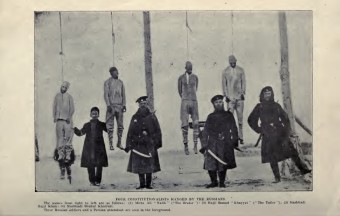
Four Persian constitutionalists hung by Russian forces in 1911 /12. Source: Edward Browne, ‘The Reign of Terror At Tabriz’, 1912.
After a year’s fighting, the constitutionalists were finally able to depose the Shah and restore constitutional rule. But in 1911 – again following a Russian ultimatum backed by the British [26] – Russia invaded Persia to dissolve the majles. In Tabriz, Persia’s second most important city after Tehran, ‘The Acting Governor reported that the Russian troops indulged in terrible brutality, killing women and children in the streets and hundreds of other non-combatants’. [27] On 26 December, the New Zealand paper The Wanganui Chronicle reported that ‘500 were killed including women and children … and an official telegram states that the outrages in Tabriz surpass those of the Italians in Tripoli. Houses are entered indiscrimately, and women violated in the presence of their relatives. Artillery mowed down every living creature in the streets.’ [28]
However, Russia’s most shocking atrocity in the years leading up to the First World War probably took place on its border with China. In 1900 the Military Governor of Blagoveshchensk ‘issued orders to expel all Chinese from the cities of the Amur Region’, resulting in the deaths of roughly 5,000 people, who were forced into the river Amur (which marks the border between Russia and China) at gunpoint. [29]
‘Shoot all who are reasonably suspected of bearing arms’
Italy and the United States were both latecomers to the First World War, joining the Allied Powers in 1915 and 1917 respectively, but both already had ample blood on their hands.
In 1911 Italy had invaded Libya, massacring thousands. On 7 November, the New Zealand Herald reproduced a sworn statement by Reuter’s Tripoli correspondent, counter-signed by by the correspondents of the Morning Post and the Daily Mirror, reporting Italian General Caneva’s order to ‘Shoot all who are reasonably suspected of bearing arms’:
‘After that, bodies of excited soldiers, often without officers, scoured the oasis for four days, indiscriminately shooting the Arabs regardless of whether or not they had partaken in the attack on the Bersaglieri. Several parties of 50 or 60 Arabs, men and boys, were collected with their hands tied, and were marched to vacant places. There they were shot without trial. Others were shot while working in their gardens. Some were bayoneted and some were clubbed to death with the butt-ends of Italian rifles. On the fourth day after the so called insurrection of the Arabs, Reuter’s correspondent saw a detachment of Italians meet three weaponless Arabs, obviously men of property. These were shot without a word of explanation. Others from Tripoli state that a reign of terror exists there. House to house searches continue, and summary punishment is meted out on the least pretence. Batches of about 50 people are executed after a minute’s trial before a tribunal of officers.’ [30]
The following day, the Otago Daily Times reported that ‘Four hundred women and children and 4000 men, whereof not 100 were guilty’ had been ‘shot in cold blood’ and that the correspondent of the Westminister Gazette had seen ’50 men and children executed’ and ‘a batch of crippled and blind beggars … deliberately shot.’ [31]
Such reports would appear to undermine Hastings’ claim that German atrocities in Belgium were ‘different’ because ‘it wasn’t just a question of the odd soldiers [sic] brutally murdering a few civilians, they were systematically shooting them in scores, and sometimes in hundreds, as hostages’ [32] – at least if the life of an Arab is to be granted the same value as that of a Belgian.
‘I wish you to kill and burn’
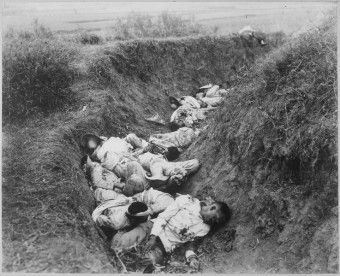
Dead Filipinos in a trench during the Phillipine-American war (1899 – 1902). Source: Wikimedia Commons.
The US record was even worse. Its brutal counterinsurgency war in the Philipines (1899 – 1902), following its ‘benevolent assimilation’ of the country in 1898, claimed the lives of over half-a-million Filipinos. [33]
‘I want no prisoners,’ US General Jacob Smith ordered his troops. ‘I wish you to kill and burn, the more you kill and burn the better you will please me.’ [34]
In November 1901, the Manila correspondent of the Philadelphia Ledger reported:
‘The present war is no bloodless, opera bouffe engagement; our men have been relentless, have killed to exterminate men, women, children, prisoners and captives, active insurgents and suspected people from lads of ten up, the idea prevailing that the Filipino as such was little better than a dog… Our soldiers have pumped salt water into men to make them talk, and have taken prisoners people who held up their hands and peacefully surrendered, and an hour later, without an atom of evidence to show that they were even insurrectos, stood them on a bridge and shot them down one by one, to drop into the water below and float down, as examples to those who found their bullet-loaded corpses.’ [35]
US President Woodrow Wilson also got in on the act, invading both Haiti (1915) and the Dominican Republic (1916) before joining the Allied Powers. In Haiti, the ensuing war claimed the lives of an estimated 15,000 Haitians, with the US occupation lasting until 1934.
In 1920 a letter from Marine Corps Commandant Barrett, ordering the commander in Haiti to stop ‘the indiscriminate killing of natives’, was inadvertently published. ‘The court-martial of one private for the killing of a native prisoner brought out a statement by his counsel which showed me that practically indiscriminate kiling of natives has gone on for some time’, he wrote. [36]
Murdering natives, stealing lands
So much for our ‘allies’, but what of Britain itself? Here again, the record – if honestly faced [37] – is extremely grim.
In 1898, British forces led by Lord Kitchener – whose moustachoied countenance now features on a First World War commemorative coin [38] – famously mowed down over 10,000 Sudanese with machine guns in a single day, wounding a further 16,000 and coming precipitously close to starting a war with France. British losses totalled 48. [39]
In a January 1906 minute regarding British ‘pacification’ operations in Africa, Winston Churchill was, once again, surprisingly forthright, in private, about what was going on:
‘The chronic bloodshed which stains the West African seasons is odious and disquieting. Moreover the whole enterprise is liable to be misrepresented by persons unacquainted with imperial terminology as the murdering of natives and stealing of their lands’. [40]
Shortly afterwards, in March 1906, Sir Frederick Lugard, Britain’s High Commissioner for the Protectorate of Northern Nigeria, sent a 500-man column ‘to take revenge on the people of [the small village of] Satiru’ following an uprising there. ‘[T]here was to be no negotiation, no attempt to separate guilty from innocent, or to save the women and children from their menfolk’s folly. Lugard insisted on “annihilation” … later estimat[ing] that his men killed 2,000 without loss to themselves. Prisoners were executed, their heads cut off and put on spikes. Then the village was razed to the ground.’ [41]
No action was ever taken against Lugard for these crimes. Indeed, he was granted a peerage for his work in Nigeria and ‘remained to dominate the Colonial Service as a retired proconsul far into the 1930s’. [42]
In terms of numbers of deaths, however, few events in world history can match the ‘Late Victorian Holocausts’ that occurred as millions of Indians, Chinese and Brazilians were ‘forcibly incorporated’ into the political and economic structures of a London-centred world economy, and then ‘murdered by the application of utilitarian free trade principles’ during three global El Niño droughts. [43]
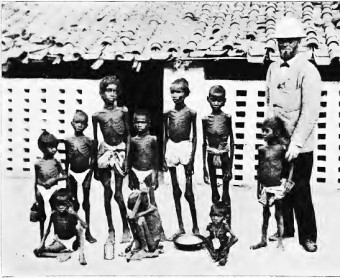
Famished children taken into care by missionaries in Indian town of Jabalpur C. P. 1897. Source: Wikimedia Commons.
In India, the national famines of 1896-98 and 1899-1902 alone may have caused over 14 million deaths from starvation and disease – at a time when India was supplying Britain with a fifth of Britain’s wheat consumption. [44]
According to the official Report on the Famine in Bombay Presidency, 1899 – 1902, much of the excess mortality could have been prevented by ‘widespread gratuitous relief from the beginning’, since ‘supplies of food were at all times sufficient’ and ‘severe privation was chiefly due to the dearth of employment in agriculture and other industries’, and the consequent collapse in people’s incomes. [45]
Instead, millions of lives were sacrificed to an official policy ‘that made an unfettered grain market more sacred in principle than the lives of small children crying from hunger’, with the British Viceroy, Lord Curzon, declaring that ‘any government which imperiled the financial position of India in the interests of prodigal philanthropy would be open to serious criticism; but any government which by indiscriminate alms-giving weakened the fibre and demoralized the self-reliance of the population, would be guilty of a public crime’. [46] For good measure Curzon raised the bar for eligibility for rations, which he also cut back, considering them to be ‘dangerously high’ rations. ‘[B]arely a fifth of estimated famine victims received any British assistance whatsoever’. [47]
Who spoke up?
Imperialism [48], and the international tensions and alliances it gave rise to, played a major role in enabling the cataclysm that was the First World War. [49] It also helped to nix pre-war ‘peace’ efforts by the Great Powers. [50] It was also, first and foremost, a crime of staggering proportions and a major moral challenge to anyone alive who could take action to oppose it.
Did anyone in Europe or the US speak out against this world-war-before-the-First-World-War? Yes, though they appear to have been a minority, even on the left. [51]
In Britain, ‘[w]hen the victory in the Sudan finally came with the Omdurman battle … the socialist press reacted with hostility. [Keir] Hardie was full of contempt for Kitchener, who, he claimed, had violated the ethics of a slaughterhouse in littering two square miles of desert with Dervish corpses.’ [52]
In 1886, the British Marxist Henry Hyndman warned, correctly, that Britain was ‘working up to a hideous economical catastrophe [in India], beside which the great Irish famine … will seem mere child’s play’, and in January 1897, ‘[a]t the inaugural meeting in London of a campaign for Indian famine relief … [he] was pulled off the dais by police when he proposed that “home charges for the current year should be suspended and the whole amount be devoted to expenditure on famine relief.”‘ [53]
In America, Mark Twain condemned the US occupation of the Philippines, writing that:
‘I have read carefully the treaty of Paris [which ended the Spanish-American War], and I have seen that we do not intend to free, but to subjugate the people of the Philippines. We have gone there to conquer, not to redeem.’ [54]
‘Not one word about the native inhabitants’
In Germany, the socialist Rosa Luxemburg condemned both British and German imperial atrocities. In her 1910 tussle with the German Marxist Karl Kautsky she accused him of ‘succumbing to nationalist fervour, praising the historical glories of the German state. Against this she posed German imperial adventures in China and the massacres in South West Africa.’ [55]
During the 1911 ‘Morocco crisis’ she condemned her own German Social Democratic party (SPD), in the pages of the Leipziger Volkzeitung, for a leaflet that it had produced justifying its failure to organise against the possibility of imminent war: ‘In the whole of the leaflet there is not one word about the native inhabitants of the colonies, not a word about their rights, interests and sufferings because of the international policy. The leaflet repeatedly speaks of ‘England’s splendid colonial policy’ without mentioning the periodic famine and spread of typhoid in India, extermination of the Australian aborigines and the hippopotamus-hide lash on the backs of the Egyptian fellah.’ [56]
Earlier that same year she had scorned British foreign secretary Edward Grey’s proposal for an international agreement to end the arms race. ‘If the European powers were serious [about peace], she said, they would give up their colonies and end their policy of carving out spheres of influence throughout the world.’ [57]
Apologists for the First World War like to argue, no doubt correctly, that a German victory would have been disastrous for many people around the world. ‘What if Germany had won?’ they ask. They fail to ask – or even to recognise the signifance of – the equally pertinent question: ‘What if the Allies had won?’
A century of horrors and atrocities across the globe suggest that the world-war-before-the-First-World-War is still far from over. [58] So is the need for those of us in the imperial heartlands to speak out and to resist.
ENDNOTES
[1] C.J. Lowe and M.L. Dockrill, The Mirage of Power, Part III, vol. 5, Routledge, 2002, p. 479. When Churchill published these remarks a decade later he deleted the words ‘an innocent record and’ and ‘mainly acquired by violence, largely maintained by force’ (Jean Bricmont & Julie Franck (eds), Chomsky Notebook, Columbia University Press, 2007, p. 44-45).
[2] Max Hastings, ‘The Necessary War’, BBC2, first broadcast 25 February 2014. Elsewhere, Hastings has claimed that ‘France, Britain and so on, they were genuine democracies [in 1914], in a way that Germany was not’ (Jeremy Vine Show, BBC Radio 2, 11 June 2013, http://www.youtube.com/watch?v=uoJbvVTAC5s). In fact none of these countries was a democracy – at least if we take on board ‘the radical idea that women are human beings’ (Marie Schear). However, even sticking to the men, Britain was certainly not a ‘democracy’ in 1914: ‘until the Fourth Reform Act of 1918, 40% of adult males didn’t have the vote, in contrast to Germany, where every adult man had the right to go to the ballot box in national elections’ (Richard Evans, ‘Michael Gove shows his ignorance of history’ – again, Guardian, 6 January 2014, http://www.theguardian.com/books/2014/jan/06/richard-evans-michael-gove-history-education).
[3] German elites were not the only ones to espouse a ‘ruthless Social Darwinism’. As Home Secretary in 1910 Winston Churchill ‘had secretly proposed sterilization of 100,000 “mental degenerates” and the dispatch of tens of thousands of others to state-run labor camps so as to save the “British race” from inevitable decline if its “inferior” members are allowed to breed’ (Noam Chomsy, Year 501, Southend Press, 1993, p. 201).
[4] Michael Gove, ‘Why does the Left insist on belittling true British heroes?’, MailOnline, 2 January 2014, http://www.dailymail.co.uk/debate/article-2532930/MICHAEL-GOVE-Why-does-Left-insist-belittling-true-British-heroes.html
[5] To give just one example, in 1920 British forces in Iraq, commanded by Aylmer Haldane ‘bombed and strafed rebellious tribes, fired on them with gas-filled shells [and] burned villages’. Haldane would later write that, ‘It is impossible to give the Arab casualties with any approach to exactitude but they have been estimated at 8,450 killed and wounded’ (Nicholson Baker, Human Smoke: The Beginning of World War II, the End of Civilisation, Simon and Schuster, 2008, p. 8).
[6] David Stevenson, 1914 – 1918: The History of the First World War, Penguin, 2005, p. 6.
[7] ‘A bloody history: Namibia’s colonisation’, BBC News, 29 August 2001, http://news.bbc.co.uk/1/hi/world/africa/1514856.stm.
[8] Sven Lindqvist, Exterminate All the Brutes, Granta, 1996, p. 149.
[9] Hastings, op. cit. Hastings also fails to note that Britain ‘often chose, pre-1914, to collaborate with Germany’s imperial ambitions’, including in German South West Africa where it ‘provid[ed] trade supplies via South Africa’ during the genocide (Heather Jones, ‘The German Empire’, p.61 in Robert Gerwarth & Erez Manela (eds), Empires at War: 1911 – 1923, Oxford University Press, 2014).
[10] Adam Hochschild, King Leopold’s Ghost, Papermac, 2000, pp. 226, 233.
[11] Hochschild, op. cit., p. 296. ‘Stories of deliberate sadistic mutilation [during Germany’s invasion and occupation of Belgium] are probably generally untrue’, notes Adrian Gregory (Adrian Gregory, The Last Great War: British Society and the First World War, Cambridge University Press, 2008, p. 308, n.31). At the same time, ‘malnutrition and disease, resulting from brutal military occupation policies, were responsible for the deaths of somewhere in the order of 250,000 Belgian civilians during the First World War’ (ibid., p. 45, emphasis in original).
[12] Hochschild, op. cit., p. 254.
[13] Hochschild, op. cit., p. 255.
[14] According to Hastings, ‘Once the shooting started it became plain that their war aims were little different from those of Hitler 35 years later, excepting only the Jewish genocide’ (Hastings, op. cit.). According to the historian David Stevenson, in his highly-praised history 1914 – 1918, ‘despite some continuities with pre-war policy, it appears that the German leaders first declared war and then determined what they were fighting for. Basically their objective was security, to be achieved through a network fo border buffer states and by weakening France and Russia’ (Stevenson, op. cit., p. 134). By contrast, ‘the Russians, like the Germans and unlike the British or the French, were quick to define their objectives. Having done so in the relatively favourable circumstances of the winter of 1914-15, they stood by them with little deviation through the greater difficulties that followed … They were more annexationist than [those of German Chancellor] Bethmann’ (ibid., pp. 137-138). Were the war aims of our Russian allies also ‘little different from those of Hitler 25 years later’? Hastings is silent on the topic.
[15] Having almost gone to war with Briain in 1898 over control of the upper Nile (‘the Fashoda incident’), France signed a series of agreements with Britain in 1904 (the ‘Entente Cordiale’), recognising British control over Egypt in exchange for British recognition of its control over Morocco. This rapidly became a de facto alliance – a key part of the international situation that enabled a Balkan conflict to escalate into a World War in a mere 37 days (Niall Ferguson, The Pity of War, Penguin, 1999, p. 64; Christopher Clarke, The Sleepwalkers: How Europe Went to War in 1914, Penguin, 2013, p. 123).
[16] According to historian Douglas Newton, ‘Britain’s choice for war was in fact made on Sunday 2 August, before Belgium was invaded’ – indeed, before the news of Germany’s ultimatum to Belgium had even reached the British Cabinet – when the cabinet agreed a pledge of naval assistance to France, and ‘was driven above all by a desire to show “solidarity” with France and Russia’ (Douglas Newton, Darkest Days: The Truth Behind Britain’s Rush to War, 1914, Verso, 2014, pp. xvii, 300). The significance of this decision has been disputed eg. David Stevenson claims that ‘as the Germans were willing to keep out of the Channel it would not have triggered British intervention’ (Stevenson, op. cit., p.35). However, its significance seemed clear to at least two of those present at the meeting that made it. Thus Churchill ‘clearly regarded the pledge as akin to war’, while Walter Runciman afterwards wrote on the top of his invitation: ‘The Cabinet which decided that war with Germany was inevitable’ (Newton, op. cit., pp. 186, 178).
[17] For example, the index for Margaret MacMillan’s mammoth massive The War that Ended Peace (which clocks in at over 600 pages) contains over 70 separate page refererences for ‘Morocco’: none of them mentions France’s 1907 shelling of Casablanca (Margaret Macmillan, The War that Ended Peace: How Europe Abandoned Peace for the First World War, Profile Books, 2014). The index does contain a reference to the ‘Casablanca incident’, but this was another diplomatic spat between France and Germany, this time over German deserters from the French Foreign Legion.
[18] ‘The Casablanca Outrage’, Taranaki Herald, Volume LIV, Issue 13498, 13 August 1907, Page 5, http://paperspast.natlib.govt.nz/cgi-bin/paperspast?a=d&d=TH19070813.2.43
[19] Clarke, op. cit., p. 196. According to Clarke ‘the rebellion had occurred deep inside the Moroccan interior and the danger to Europeans was remote.’ He also notes that the Moroccan Sultan’s appeal for French intervention ‘had in fact been formulated by the French consul and … passed to him for signature after Paris had already decided to intervene.’
[20] Susan Gilson Miller, A History of Modern Morocco, Cambridge University Press, 2013, pp. 94, 96.
[21] Ibid., p. 96.
[22] Douglas Newton, British Labour, European Socialism and the Struggle for Peace, 1889 – 1914, Oxford University Press, 1985, p.172. ‘Pact between predators’ is Newton’s gloss.
[23] Maciej Bartkowski, Recovering Nonviolent History: Civil Resistance in Liberation Struggles, Lynne Rienner, 2013, p. 151.
[24] Ibid., p. 154.
[25] W. Morgan Schuster, The Strangling of Persia, Century Co., 1920, p.xxxv.
[26] Bartkowski, op cit., p. 154.
[27] Schuster, op cit., p. 219.
[28] ‘The Tabriz Massacre’, Wanganui Chronicle, 28 December 1911, http://paperspast.natlib.govt.nz/cgi-bin/paperspast?a=d&d=WC19111228.2.13.21.2
[29] Viktor Innokentievich Dyatlov, ‘The Blagoveshchensk Drowning—Story of How Phobias Become a Reality’, Sensus
Historiae, vol VIII (2012/13), pp. 71 – 90. http://www.sensushistoriae.epigram.eu/index.php/czasopismo/article/view/33 The Governor ‘was relieved of his command, … [but] was retained in military service without demotion … After a due period of time had passed, he was appointed Governor of one of the Western provinces of the Russian Empire.’
[30] ‘Ghastly reign of terror’, New Zealand Herald, 7 November 1911, http://paperspast.natlib.govt.nz/cgi-bin/paperspast?a=d&d=NZH19111107.2.58&cl=&srpos=0&e=——-10–1—-0–&st=1
[31] ‘Slaughter of the Arabs’, Otago Daily Times, 8 November 1911, http://paperspast.natlib.govt.nz/cgi-bin/paperspast?a=d&d=ODT19111108.2.41&cl=search&srpos=3&e=——-10–1—-0tripoli+mosque+burned–
[32] Hastings, op. cit.
[33] Clarke, op. cit., p. 152.
[34] Greg Grandin, Empire’s Workshop: Latin America, the United States, and the Rise of the New Imperialism, Metropolitan Books, 2006, p. 22.
[35] Howard Zinn, A People’s History of the United States: 1492 – Present, Harper Perennial, 1995,
p. 308.
[36] Hans Schmidt, The United States Occupation of Haiti, 1915-1934, Rutgers University Press, 1995, p. 106.
[37] The following exchange, between Max Hastings and Marxist historian Neil Faulkner, taken from a June 2013 edition of the Jeremy Vine Show (op.cit.), is highly revealing in this respect.
Max Hastings: Whatever one says about the other Western European powers, France, Britain and so on, they were genuine democracies [in 1914], in a way that Germany was not …
Neil Faulkner: There was no democracy in the British empire … the British were willing to shoot down demonstrators in Ireland, in Egypt and in India …
Max Hastings: Oh come on, this is what I call the flagellatory sort of masochistic school of British history … It’s awfully sad when I hear somebody like yourself, the determination to win a headline by rubbishing Britain is so depressing …
As we have seen, Hastings is perfectly happy to cite German colonial atrocities to bolster his case, but if anyone dares to mention British crimes then they are being ‘masochistic’ and ‘flagellatory’ and ‘rubbishing Britain’.
[38] ‘Lord Kitchener gets the call-up to appear on new £2 coin’, Guardian, 31 December 2013, http://www.theguardian.com/world/2013/dec/31/lord-kitchener-new-2-coin-royal-mint
[39] Adam Hochschild, To End All Wars, MacMillan, 2011, p.18; Lindqvist, op cit., p. 67.
[40] Thomas Pakenham, The Scramble for Africa, Abacus, 2001, pp. 651-652
[41] Ibid., pp. 652 – 653.
[42] Toyin Falola, Colonialism and Violence in Nigeria, Indiana University Press, 2009, p. 19; Pakenham, op. cit., p. 653.
[43] Mike Davis, ‘The Origins of the Third World’, Corner House Briefing #27, December 2002, p.29, http://www.thecornerhouse.org.uk/resource/origins-third-world#fn026
[44] Mike Davis, Late Victorian Holocausts, Verso, 2000, pp. 152, 173. Mike Davis, ‘The Origins of the Third World’, Corner House Briefing #27, December 2002, n.26, http://www.thecornerhouse.org.uk/resource/origins-third-world#fn026
[45] Mike Davis, Late Victorian Holocausts, Verso, 2000, pp. 161, 175.
[46] Davis, op. cit., pp. 162, 169.
[47] Davis, op. cit., pp. 164, 175.
[48] In his 1923 book Labor and Empire, the Chinese historian Tingfu F Tsiang defines imperialism, firstly, as ‘the process of gaining control, partial or complete, of other peoples and lands for the political advantage, fancied or real, of the home people and country’. Secondly, as ‘the process of keeping such control, once gained, in opposition to the expressed wishes of the people so controlled’, and thirdly as ‘the augmentation of armaments on land and sea and the formation of diplomatic alliances, understandings and accommodations for the purpose of adding to or keeping empires’ (T’ing-fu Chiang, Labor and Empire: A study of the reaction of British labor, mainly as represented in Parliament, to British Imperialism since 1880, Columbia University, 1923, p. 26). With some caveats eg. to recognise the phenomenon of internalized colonialism and the fact that neither ‘home peoples’ nor ‘countries’ are usually actors on the world stage, this seems like a useful definition.
[49] For a summary of the evidence, and sources, see Emily Johns & Milan Rai, ‘Tell me lies about the Great War’, Peace News, August 2014. http://peacenews.info/node/7708/tell-me-lies-about-great-war
[50] In 1898 the Tsar invited the world powers to meet to discuss the arms race. Specifically, the Russians had suggested ‘a freeze in increases in each country’s military [and] limits on some of the new and more deadly weapons that were appearing’. However, ‘The [British] Admiralty told the government that a freeze on naval forces was ‘quite impracticable’, and that any restriction on new and improved weapons ‘would favour the interests of savage nations, and be against those of the more highly civilised.’ (Margaret Macmillan, The War that Ended Peace: How Europe Abandoned Peace for the First World War, Profile Books, 2014, pp. 279 – 280)
[51] According to Tingfu F Tsiang, ‘the predominant characteristic of the reaction of British Labor to British Imperialism in Africa from 1880 to the 1920s is acquiescence’ (Newton, op. cit., p. 58). The situation in Germany appears to have been somewhat different, at least for a time, with the German Social Democrats (SPD) ‘put[ting] German colonial brutality at the centre’ of its campaign for the 1907 elections to the Reichstag (Harry Harmer, Rosa Luxemburg, Haus Publishing, 2008, pp. 68 – 69). Of course, as is still the case today, atrocities committed by official enemies could be – and were – loudly denounced, with the result that pre-war German atrocities in Africa ‘became a central tenet of British wartime propaganda’, despite Britain’s de facto support for them at the time (Jones, op. cit., p. 66; see note 9. above re. British support).
[52] Newton, op. cit., p.61. Hardie visited India in 1907, where he ‘openly denounced the character of British rule’ there, describing the latter, in his book India: Impressions and Suggestions, as ‘a huge military despotism tempered somewhat by a civil bureaucracy’. However, he ‘he did not argue for the immediate withdrawal of the British from India, but only for the gradual extension of self-government as had recently been implemented in Australia and South Africa’ (Kenneth Morgan, Keir Hardie: Radical and Socialist, Weidenfeld and Nicolson, 1985, pp. 192, 194-195).
[53] Davis, op. cit., pp. 141 – 143. According to Davis, Hyndman’s Social Democratic Federation (SDF) ‘was the only British political organization which never wavered in its attention to India’s famine victims’ (p. 165). Whatever his feelings about British imperialism, Hyndman would go on to support Britain in the First World War.
[54] Helen Scott, ‘The Mark Twain they didn’t teach us about in school’, International Socialist Review 10, Winter 2000, pp. 61-65. http://www.marxists.de/culture/twain/noteach.htm
[55] Harmer, op. cit., p. 80.
[56] Ibid., p. 84.
[57] Ibid., p. 83. When the war came Luxemburg opposed it from the start, and was eventually interned as a threat to the state (ibid., p.107).
[58] For a survey of US military and covert interventions around the globe since 1945 see William Blum, Killing Hope: US Military and CIA Interventions Since World War II – Updated Edition, Zed, 2014. For a similar look at the British record see Mark Curtis, Unpeople: Britain’s Secret Human Rights Abuses, Vintage, 2004. According to Curtis, ‘Britain bears significant responsibility for around 10 million deaths since 1945… including Nigerians, Indonesians, Arabians, Ugandans, Chileans, Vietnamese and many others.’ (ibid., p.2)


